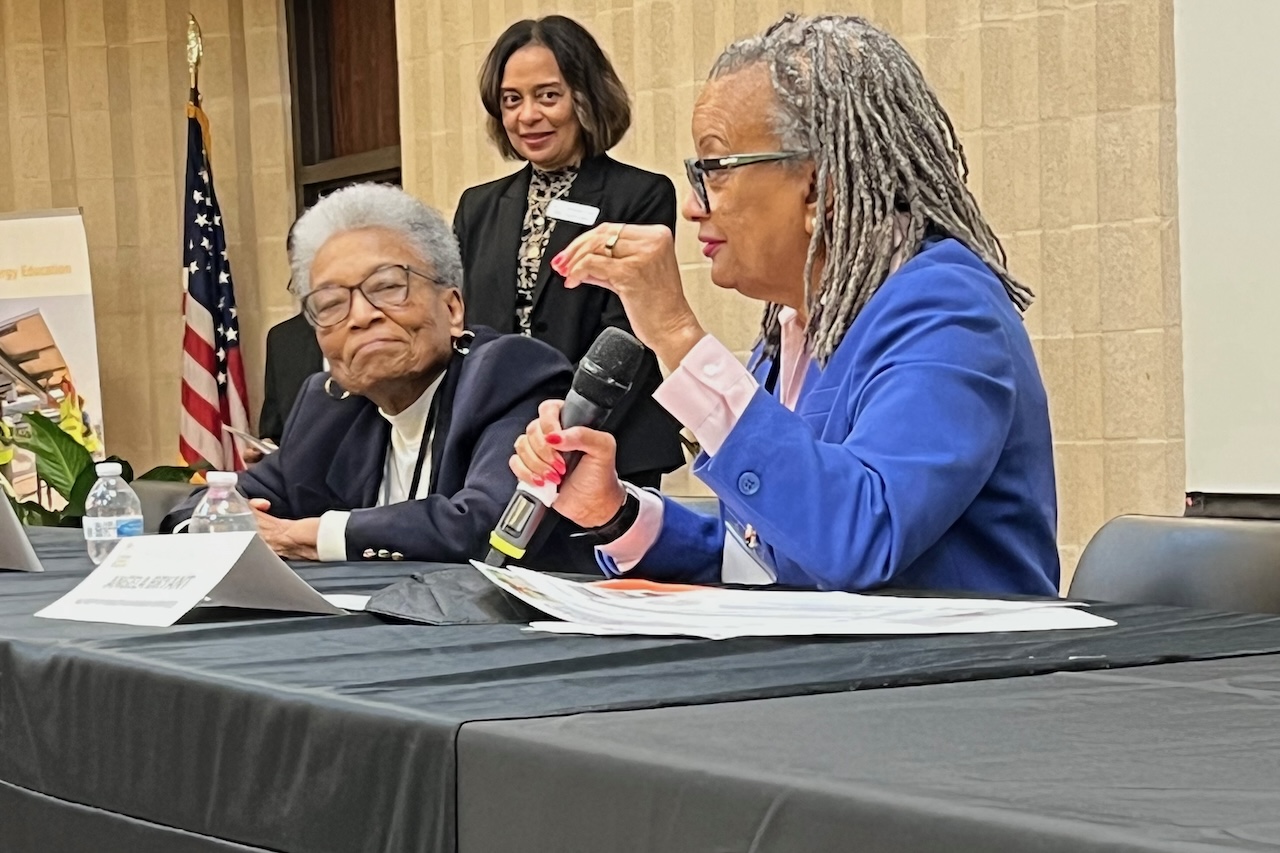Northeastern North Carolina rural communities are poised to shape their future through informed advocacy for healthy, resilient communities through increased integration of renewables into their energy mix participants in a session hosted by the Center for Energy Education learned recently.
C4EE hosted at Kirkwood Adams Community Center its Thriving Communities Convening — Empowering Northeastern NC — a gathering to discuss the range of available federal funds through the Inflation Reduction Act and other recent legislation for renewable energy investments into healthy, innovative solutions.
The IRA designates 40 percent of its benefits to fund and finance projects within rural and underserved communities.
C4EE facilitated a hometown version of the Thriving Communities Program, a federal initiative that provides intensive technical assistance to under-resourced and disadvantaged, rural and Tribal communities.
The program encourages capacity building to help these communities identify, develop and deliver empowerment and engagement opportunities for economic revitalization in workforce, transportation and clean energy technologies as well as improved access to health care, food security and education.
Invited participants from a 10-county radius of Halifax County heard firsthand details of historic funding opportunities for disadvantaged communities to mitigate climate change and promote economic growth from a diverse collection of community partners.
Agents from state and federal agencies, community development, financial institutions, technical resource providers and philanthropic organizations outlined strategies and sources from which they can seek these benefits.
The no-cost daylong event provided a platform to share perspectives and exchange ideas.
The convening delivered information to local leaders and citizens to better understand North Carolina’s clean energy environment.
Area leaders, industry professionals as well as state and federal delegates served as panelists to inform participants about clean energy opportunities and advocacy for renewable investments within it, especially those that spotlight economic and environmental challenges unique to rural communities.
Philanthropic organization leaders from the HIVE Fund and REACT 4 RTI as well as a Vote Solar industry professional facilitated conversations among panelists who offered guidance and input that outlined how communities can proactively align and prioritize infrastructure projects related to wellness, broadband, weatherization, energy costs, capacity demands and clean energy jobs.
Representatives from the State Energy Office, the NC Department of Transportation, USDA, the NC Clean Energy Fund and the NC Conservation Network, among others, advised participants of approaches to successfully seek and secure funds.
North Carolina Governor’s Office Climate Change Policy Officer Conor Mulderrig recommended that organizations, when allowed, combine funding sources — tax credits, grants, incentives, even green bank funds – to get the total cost of the investment. “It can be complicated but it’s an advantageous opportunity,” he said. “We’re here to help.”
He added that state agencies are stretching and sharing their efforts and expertise in their grant pursuits to expand their reach to attain the awards.
He noted that his office is working with the State Energy Office as well as the Department of Cultural and Natural Resources to pursue regional and statewide projects.
The discussion also included input from grant writers and technical assistance staff who provided insight for participants to meet the required competencies for solid grant proposal submissions.
These individuals advised participants of strategies to discover and acquire specifications for funding sources for federal infrastructure and economic stimulus programs that focus on clean energy technologies, energy efficiencies and green energy jobs.
These panelists encouraged collaboration among community partners to not only amplify their voices but also support grant writing roles that may be absent among rural communities government staff rosters.
“We assembled representatives from economically distressed counties, oftentimes overlooked, and for whom we want to help understand and procure opportunities so they can thrive,” said Mozine Lowe, executive director of C4EE. “Through three specifically curated panel discussions, these experts highlighted factors that have prevented our stakeholders from securing grant funds in the past.”
Outgoing Halifax County Commissioner Carolyn Johnson stressed community connection and collaboration as drivers of strong economic impacts.
She noted the importance of fostering the use of a cooperative business model – where the community can partner from front porches to boardrooms — to meet needs, swap ideas and grow investments. “We are a county of innovators and changemakers,” she said.
The convening also highlighted the environmental justice movement — and its Northeastern NC roots — that has built the foundation of healthy communities and ultimately clean energy integration into the mainstream.
The center also showcased its high school student ambassadors, the Radiant Rays, who add to its focused mission toward educating and advocating for climate change and social justice.
C4EE also debuted a snippet of its Don’t Forget Rural Communities film that features Warren County’s role in defining and illuminating the environmental justice movement and the federal government’s mitigation response.
Former US Congresswoman and Warren County native Eva Clayton spoke on Northeastern NC’s resiliency to overcome its community challenges. “We are responsible for having a healthy community,” she said. “We need governments to be engaged, but guess what, government responds to those who demand interest in them. We must love ourselves enough to be responsible to be advocates for ourselves.”
North Carolina Department of Health and Human Services Assistant Secretary for Equity and Inclusion Angela Bryant also addressed her perspective of mobilizing for action.
She noted the need for five components: having a laser focus, building relationships, prioritizing inclusion, incorporating persistence and taking action.
She elaborated these points through recent health initiatives related to the Covid vaccine and Medicaid expansion, noting these initiatives restored protections and provide expanded care choices. “Health is the core of a thriving community,” Bryant said. “There’s no success without action. We can do it; we must just do it and do it together.”






